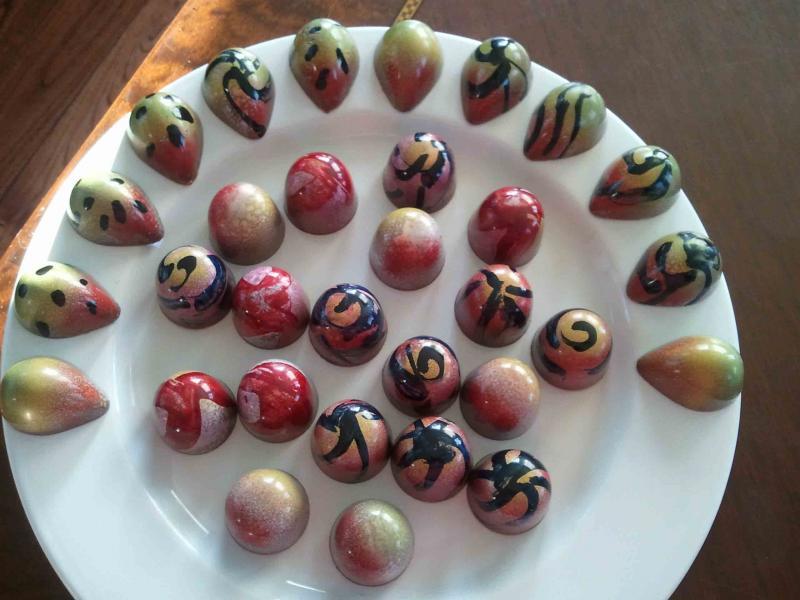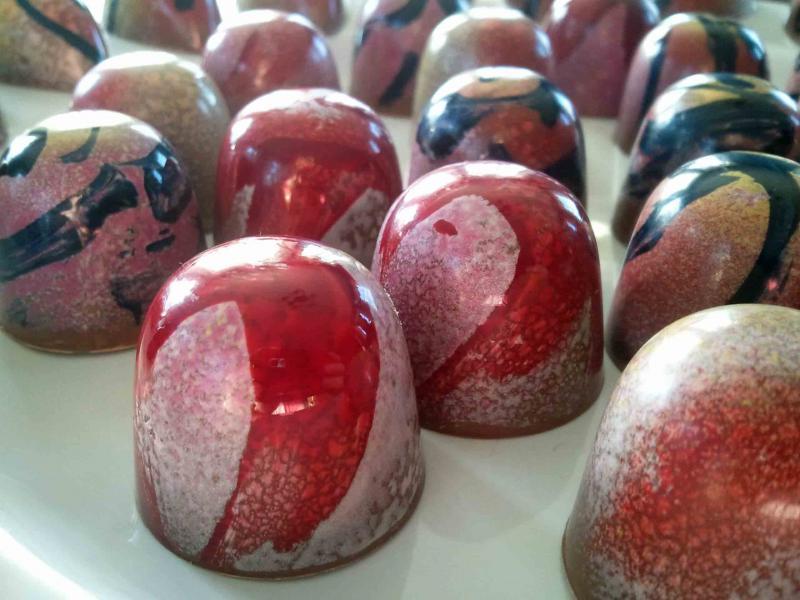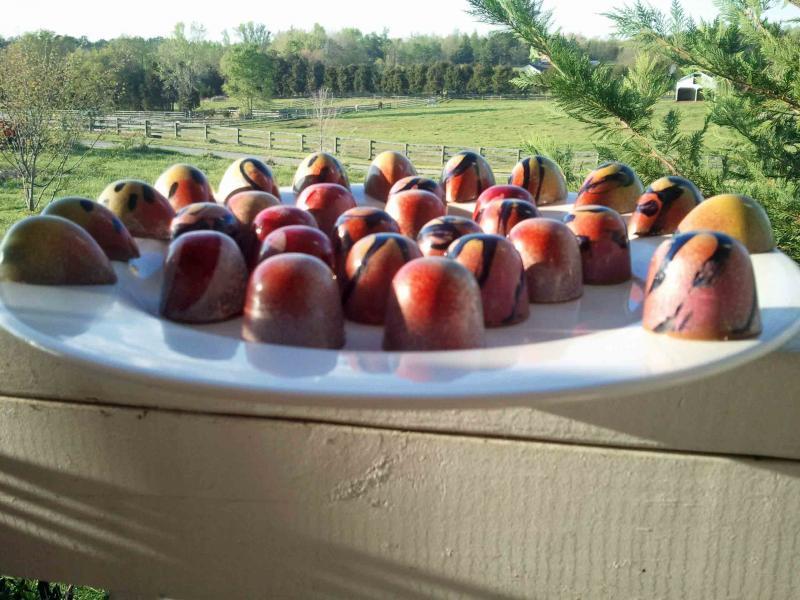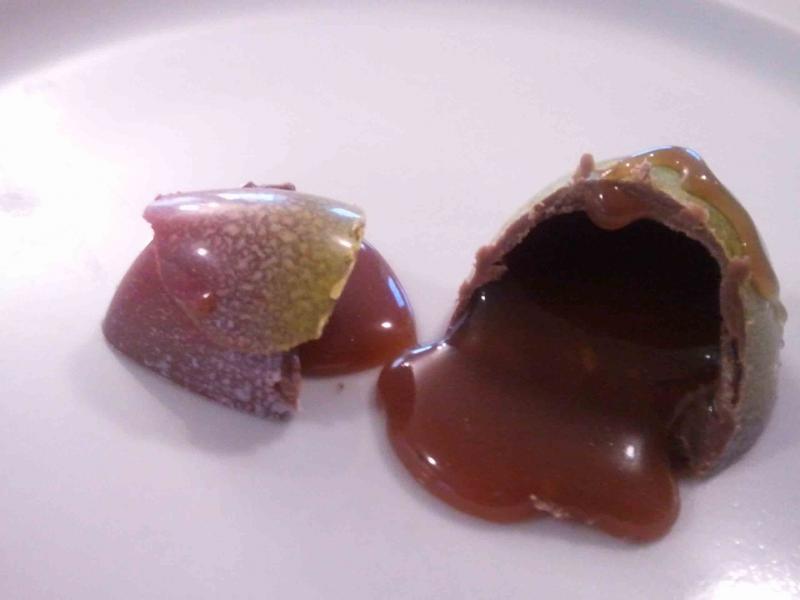-
Posts
649 -
Joined
Content Type
Profiles
Forums
Store
Help Articles
Everything posted by tikidoc
-
I'll check Whole Foods the next time I get a chance!
-
Not really, I love dark chocolate. I'd be interested in trying whatever I can. I only buy milk and white chocolate to make stuff for other people!
-
Panaderia Canadiense, I'd be interested in hearing more about the Kallari as well.
-
No, just dyed green with nasty chemicals. Same for this one: Number-one-son is into badminton, so he wants a badminton-cake to take to school. Could have made a cake-shuttle cock, but that is way to involved for a weekday Wow, Mette, that would be borderline too involved for a weekend for me! And no way mine would come out looking so nice! You are great with a piping bag!
-
I love making another pizza with caramelized onions. Lots of the onions, a drizzle of good olive oil, chèvre, and a sprinkling of sea salt. Yum.
-

Food's Biggest Scam: The Great Kobe Beef Lie
tikidoc replied to a topic in Food Traditions & Culture
I absolutely think that calling them Kobe or anything with the word Kobe is potentially misleading, especially since this refers to a specific appellation (or whatever one calls it with livestock). I don't really have a problem with "American Wagyu" though. As I understand, "Wagyu" translates to "Japanese cattle". This is what they are, at least the full blooded cattle that were either imports or descended entirely from imports. There is a registry for these animals in the US, which provides some assurance of what they are (NOT as far as the USDA is concerned, that's another story). They do come from a couple of different Japanese populations but the beef, as I understand, is similar, so crossing them and calling them "American Wagyu" does not seem unreasonable. New breeds of animals are started all the time, and this name does correctly identify their heritage. And yes, one could argue that then someone could import any breeding animal from Japan, high quality or not, and call it "Wagyu" but realistically, that's unlikely to happen. Importing livestock is very expensive. They have to be quarantined after importation, and the process is not cheap. I'm not sure about cattle, but I can tell you that importation of a horse from Europe to the US will run you around $10K. So they are not going to import lousy stock. You don't spend that kind of cash unless you are really trying to improve your herd genetics. If they are crossed with another beef breed, as is commonly done in the US, then it should be labeled as such, as in Wagyu/Angus, the most common cross. As ScottyBoy illustrated, whatever you are going to call these animals, the beef does deserve a different name of some kind, because the marbling you see is just not the same thing as a good quality Angus steak. -
I don't think it sounds sinister. I think it sounds misleading. When I buy milk, I expect it to contain just milk. OK, and some added vitamin D. When I buy ground beef, I expect it to be meat that has been ground, not a bunch of heated centrifuged scraps that have been sprayed with ammonia. The problem in the US, and now, it appears, in Australia as well, is that we CANNOT trust what is in our foods to be what we think it is. It's not that this crap is in the food, it is that the food is not required to be labeled as having this crap in it.
-
Different gasket, I think. I replaced the easy one, and the thing still leaks all over. It's north of the brew head.
-
Those are adorable, Ruth! What's the filling?
-
If you are handy and might be interested in some sort of a trade for a Silvia that needs a new gasket, PM me. I have not had the time to mess with it, and I have not been able to find a place to get it looked at. And I think the Silvia is more than I need.
-

Michigan Orders Slaughter Of All Heritage Breed Pigs
tikidoc replied to a topic in Food Traditions & Culture
Why not just get it right the first time? -
Silly me, I looked in the list under "Wicked Good" not "WGC". Thanks, Kerry!
-
Thanks, Karlos! They sell that in our area, I need to try it. This may be useful for some people, BTW http://www.nakedwhiz.com/lumpindexpage.htm?bag They didn't review the Wicked Good stuff though.
-
Agree with rotuts on the sample packs from SMs. I order from them a couple times a year, and usually get a sample pack as well as several coffees that I pick out. I have received some really good coffees in the packs, some of which were on the pricey side or limited availability - definitely not rejects. They have also been offering a lot more espresso blends of late (http://www.sweetmarias.com/coffee.other.blends.php). I have not tried any of these recently, but I have tried the "monkey" blend in the past and it was good. Matthew, wind and ambient temperature can make a really big difference in roasting times with the heat gun method, so just be patient if it is windy out, and expect things to take longer. Jess
-

Food's Biggest Scam: The Great Kobe Beef Lie
tikidoc replied to a topic in Food Traditions & Culture
Would I pay more? Probably not as much as many are charging for it. I have had "Wagyu" and "American Kobe" in restaurants before, and it was good but not worth a huge markup to me. But who knows what it really was and how it was raised. In general, I strongly prefer grass fed beef (both for flavor and health reasons), and I would bet most of what I have tried was grain fed. That's why we are experimenting and breeding our own. We raised one grass fed beef out of the Angus cow that we have, and the meat was excellent (100% Angus- really!). We have bred that same cow to a registered Wagyu bull with excellent beef genetics (based on genotyping). It will also be grass fed. I'll let you know if it's awesome in a couple years, and I'll be able to tell you how it compared to the full Angus with the same mother and similar environment (we have moved from TN to VA, so terroir might be a factor). Other advantages to the Wagyu - they tend to make smaller calves (therefore easier calving), and they tend to be fairly mellow, so easy to work around. Important I do think they are justified in charging somewhat more for it because it is more expensive to raise than a breed like Angus. Although the Wagyu (I'm talking about the cattle registered and marketed as Wagyu in the US) tend to be efficient in converting feed (either grain or grass) to meat, they also mature at a later age than other meat cattle, so they need to be kept around longer before slaughter. Also, they tend to have a healthier balance of fats (less saturated fat and less cholesterol), so that would be worth some extra cost to me. I'm also not sure how to add this to the comparison, but most of the Wagyu/Wagyu cross beef is graded Prime (compared to less than 2% prime for beef cattle overall), and this is one of the big things that Wagyu bull owners stress when marketing semen to breeders. Prime is more expensive than Choice, regardless of breed, and if you can produce more Prime, your beef will be worth more. -

Food's Biggest Scam: The Great Kobe Beef Lie
tikidoc replied to a topic in Food Traditions & Culture
They have a registry, requiring certain documented lineage and genetics. The American Wagyu Association may not use the term "breed" in their literature (that I have seen) but it certainly fits just about any definition of a "breed" of livestock that I have seen. I would also not rely on the USDA to certify as to an animal's breed. For example, "Angus" is certainly a breed of cattle, but there are plenty of animals that the USDA certifies as "Angus" that are not full Angus - they are just black cows with prime or choice meat. My point is certainly not to defend either the marketing or the USDA certifications, as both are misleading. What I argue with is the assertion that the term "Wagyu" is "meaningless", because it is not. I can't register my Angus or my Jersey or my Mini Jersey or my Dexter/Hereford cross as Wagyu, because they don't meet any of the criteria. If an animal is either registered Wagyu or a cross (such as an Angus/Wagyu cross), that DOES have meaning, because there are requirements for animals to be registered as Wagyu with the American Wagyu Association. They have to descend from certain animals and the purebreds have to undergo genetic testing. And statistically, they are much more likely to produce USDA Prime beef than your average US steer. Bottom line, if the USDA certifies beef as Wagyu, I would not put a lot of stock in that. But if I purchased beef directly from a producer (and many Wagyu breeders do sell directly to the public) as either "pure Wagyu", or more likely Wagyu crossed with a more common beef breed such as Angus, then that would have significance. -

Food's Biggest Scam: The Great Kobe Beef Lie
tikidoc replied to a topic in Food Traditions & Culture
I don't know that it's an agribusiness construct, it appears to mostly be smaller producers that produce registered animals. The commonly used definition for a "breed" of animal is "Animals that, through selection and breeding, have come to resemble one another and pass those traits uniformly to their offspring." In the case of Wagyus in the US, the foundation stock came from a select number of imported Japanese cattle, selected for their superior meat genetics. They came from several different genetic lines (different Japanese breeds), but they had some similar characteristics due to line breeding that occurred in Japan. The "American Wagyu" is no less a breed than any other breed of livestock. They have similar characteristics and they have a registry for breeding stock. They even require genotyping for registration of breeding animals, which is more than many other livestock breeds require. They use the name "Wagyu" because it describes something about the heritage of the animals - 'Wa' means Japanese or japanese-style and 'gyu' means cattle, and the lineage of the animals traces to Japanese imports. I don't think that "acknowledgement by the USDA" as a breed is meaningful either. How many breeds of cattle does the USDA recognize? I own a registered Miniature Jersey cow and a registered Jersey, as well as a herd of registered Nigerian Dwarf and LaMancha goats. One of my horses is a registered Thoroughbred, and one is a registered Belgian Warmblood. I doubt the USDA recognizes any breed that I have but they are certainly meaningful in that all of the animals that are registered share certain characteristics and lineage. -

Food's Biggest Scam: The Great Kobe Beef Lie
tikidoc replied to a topic in Food Traditions & Culture
What's meaningful to me, as someone who plans to eat, not sell, their beef, is the quality of the beef. The "Wagyu" that were imported to the US from Japan for breeding were imported because they were sires that produced high quality beef with a large amount of marbling. They may have come from different Japanese breeds (which, incidentally, trace back, in part, to English and European breeds such as Devons, Angus and Simmentals, in addition to the native Asian cattle) but the individuals that were imported to the US were imported to introduce genetics that produce a high quality meat. I don't know much about the USDA rules, but there is now an American registry of Wagyu cattle ("Wagyu" is now a breed in the US) and all breeding animals must undergo genetic testing for parentage in order to be registered as purebred. So at least from a breeding standpoint, it is not meaningless. -

Food's Biggest Scam: The Great Kobe Beef Lie
tikidoc replied to a topic in Food Traditions & Culture
They probably should come up with a new name for what is called "American Kobe beef" here in the US, because that is a misnomer. Many are using the term "Wagyu beef" now, which is a bit more accurate, although most in the US are Wagyu crossed with Angus. That said, I think there is something to be said for improving the US genetics with Japanese breeds. The imported Wagyu cattle have better marbling, more of the animal's fat within the meat (as compared to backfat), lower cholesterol, and higher levels of monounsaturated fatty acids (healthier fat). In the US, Wagyu sires generally undergo genetic testing looking for specific genes contribute to marbling, feed efficiency, and tenderness. The most common system is the "Genestar" system, which looks at the number of copies of certain desirable genes. Some breeders are getting over 90% prime grading on their cattle using the Wagyu crosses (something like 2% of beef in the US is prime). We have a few cows that we raise for both milk and beef, and currently have an Angus cow bred to a high quality Wagyu bull. I'm looking forward to our own experiment with "American Kobe", but it will be a couple years until I can report on the results. -
Who knows, it may have been in the freezer with a bunch of fish too. I wouldn't panic yet. I would mention it to the farmer though.
-
Ask the farmer about feed. Some feeds do have fish meal in them, which can give the meat an off flavor. Pork can also taste funny if it has "boar taint", which can happen with some breeds if they slaughtered later than usual. I would chat with the farmer before buying half a pig.
-
Yup, agree with all of the above. Be nice about it, and you are going to gain some business. I think more people than not will buy something after using the bathroom.
-
Check out http://www.sweetmarias.com/library/content/using-sight-determine-degree-roast, for an idea of visual cues. Sweet Marias' website is not just a great place to buy coffee and equipment, it has a huge wealth of information about beans, roasting and brewing. I'll look around and see if I can find a video that has first and second crack so you can hear the difference, but think popcorn for firat and Rice Crispies for second. You should be able to hear it even with the heat gun. I usually have my fan on high. One of the reasons I like the heat gun method is that I can still hear the cracks well, as opposed to more contained methods like drum roasters, and obviously you can see everything going on too. Jess
-
I have definitely gotten into second crack, with good results. I usually stop just a little into second crack, although I have gone a bit further than I wanted once or twice and started to have the beans start to look a little oily. The time between first and second crack seems to vary quite a bit depending upon the bean I'm using. I have not timed it but there is definitely a difference from batch to batch and bean to bean. I would say to be patient and keep stirring. Have you used other methods before, so that you know what you are listening for? For those who have not done much coffee roasting, first crack is more like a popcorn sound, but a little quieter. Second crack is kind of like an amplified Rice Crispies in milk sound (similar sound but louder, but not as loud as first crack).
-
I finally got around to trying the caramel today. I had just mixed the liquid ingredients and started warming them when I discovered... no sugar. Yea, I know, get all your stuff out first but I just bought a small bag of sugar recently and I have barely used it... turns out hubby used it in a brine. Oops. So since we live over 20 minutes from the nearest grocery and they are probably closed anyway (Easter in a small town), I made the recipe with brown sugar. Otherwise I followed the usual recipe but just heated to 225. I think the brown sugar flavor was a little stronger than I would like, but it did add a pleasant flavor, just too much of it. So maybe a mix of white and brown next time. The consistency was exactly as I wanted, easy to pipe and oozes into your mouth when you bite into the chocolate.






